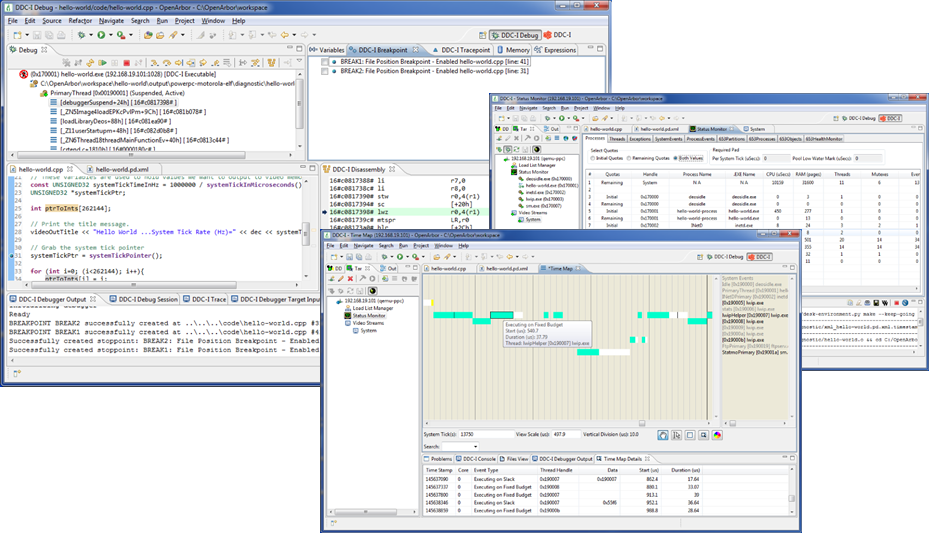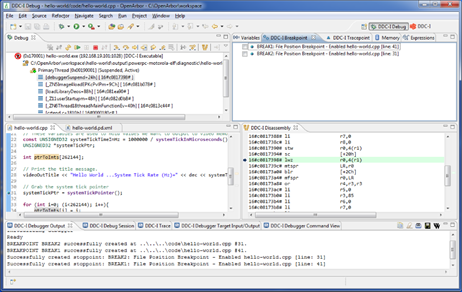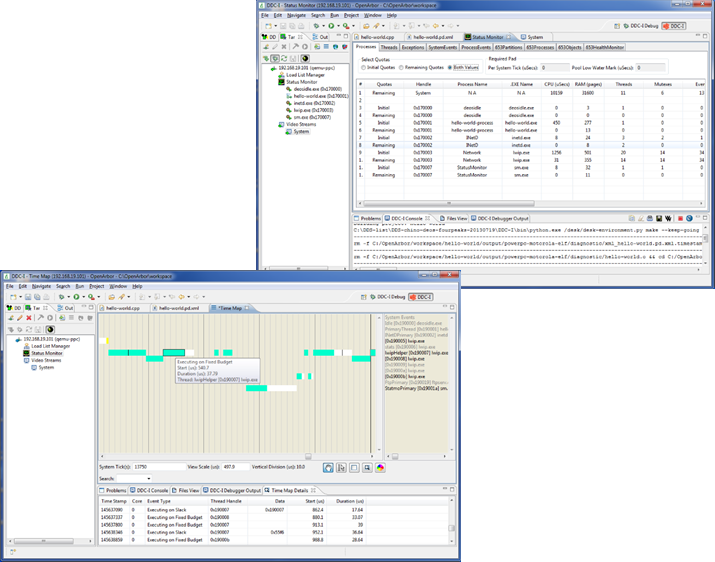
DDC-I Developer Suite (DDS) for Deos is a complete Integrated Development Environment (IDE) and tool suite, targeted at developing applications on Deos™, DDC-I’s DO-178 Certifiable DAL A time and space partitioned Real-Time Operating System (RTOS).
DDS for Deos offers avionics software developers an efficient, feature rich, IDE & development tools that are ideally suited for safety critical real-time embedded applications. The DDS toolsuite connects to the Deos target via Ethernet, or via an optional serial connection, and utilizes Deos’ patented slack scheduling technology to allow non-invasive communication & monitoring with the development target. For customers purchasing the certification package for Deos, DDS also offers a set of qualifiable verification tools that conform to the guidance of DO-330/ED-215 for the DO-178 development process. DDS uses FLEXlm licensing.
Development & Debugging
Integrated Development Environment
OpenArbor™ is an Eclipse-based integrated development environment, which utilizes the open Eclipse framework to provide mixed language support for real-time embedded applications. All Eclipse functions are also available from the command line which allows developers to do scripting etc. OpenArbor is fully integrated with DDC-I’s Deos, a time & space partitioned DO-178 Level A certifiable real-time operating system. Additionally, the industry standard Eclipse framework offers access to third party tools, which provides the user valuable flexibility to integrate other tools to meet their needs.
Compilers
- GCC C/C++
- Optional DDC-I’s SCORE® Ada 95
Current versions of these compilers are provided. Both of these compilers are supported by the qualified Assembly Branch Coverage (ABC) structural coverage analysis tool (listed under verification), which then permits a high degree of optimization levels.
Debugger
Full-featured debugging is supported via Ethernet or optionally a serial connection to the development target running a GDB server. Additionally integration to the Lauterback Trace32 toolset is available.
QEMU
QEMU is a free and open-source emulator that performs hardware virtualization. This allows you to run Deos for any supported target architecture, on your host development system.
IOI, Testing & Simulation
IOI, a modular data distribution service (IO data transport layer) used for inter-partition data communication for use in service. It can also be utilized as an input simulator and output monitor during development, debug & verification testing.


Configuration
Integration Tool
The XML-based integration tool allows developers to specify processes, threads, platform/hardware resources, resource ownership/utilization, etc, including execution rates and time budgets, RAM/FLASH allocations, etc. These defined specifications are used to “configure” Deos on a given platform.
Execution Visualization
Status Monitor
Status Monitor allows developers to observe budgeted vs. actual usage resource utilization, including time budgets, RAM/FLASH allocations. It also logs events and exceptions. No application instrumentation is required, and target side communications are scheduled via slack scheduling to not affect the timing of tasks running on the development target.
Verification
Configuration & Verification Tools
DDS supplies 4 configuration verification tools and associated documentation which provide the guidance and data required to get through the qualification process. These tools conform to the guidance of DO-330/ED-215. Tools include ABC Tool Qualification, Deos 653 Configuration Verification Tool, IOI Configuration Verification Tool and a Registry Configuration Verification Tool.
Timing Analysis
The DDS includes a unique Deos Critical Time Kernel which is an instrumented version of Deos that measures worst-case, target-specific kernel timing (e.g., context switch times, etc). This tool then frees Deos developers from creating their own tests to capture this critical timing information, that’s unique to their target design.
Application Profiling
Profiling is also available during the verification phase because these tools run on Deos slack time & therefore do not impact critical execution timing.
Structural Coverage Analysis via ABC
Structural Coverage Analysis (SCA) is supported at the object-code level. No source-object trace-ability is required for DAL A when using ABC and no compiler qualification is required, which allows DDS to stay current with the latest GCC releases & processor support. ABC is a qualified verification tool and is specified as a valid means of coverage by the DO-178C standard.
Third Party Tools
DDC-I also supports the integration of many popular third party tools with Deos.

